Can You Freeze Apple Cider
You can safely freeze apple cider to extend its shelf life and preserve its flavor and nutrients. To do so, cool the cider to room temperature, then store it in airtight, freezer-friendly containers like glass or plastic bottles, or freezer bags. Leave enough room in the container for expansion during freezing and label it with the contents, date, and expiration date. Frozen cider can last indefinitely, but it's best consumed within a year for peak freshness. Store it at 0°F (-18°C) or below to maintain quality and flavor. Now that you know the basics, explore the world of frozen apple cider possibilities ahead!
This post may contain affiliate links. If you make a purchase through these links, I may earn a commission at no additional cost to you. Additionally, portions of this post may be generated using artificial intelligence (AI) technology. While we strive for accuracy, please be aware that AI-generated content may not always be perfect and should be fact-checked when necessary.
The Spatula Scoops
- Apple cider can be frozen to preserve its quality and flavor, and it will last indefinitely when stored at 0°F (-18°C) or below.
- Before freezing, cool the cider to room temperature to prevent bacterial growth, and use airtight containers with headspace for expansion.
- Frozen apple cider can be thawed and refrozen multiple times without affecting its quality, making it a convenient and shelf-stable ingredient.
- When freezing, use airtight, freezer-friendly containers, such as glass jars or plastic gallon jugs, to prevent freezer burn and other flavors from affecting the cider.
- Thawed apple cider can be enjoyed warm or chilled, sweetened or unsweetened, and with or without spices, and can be used as an ingredient in various recipes.
Apple Cider Characteristics Explained
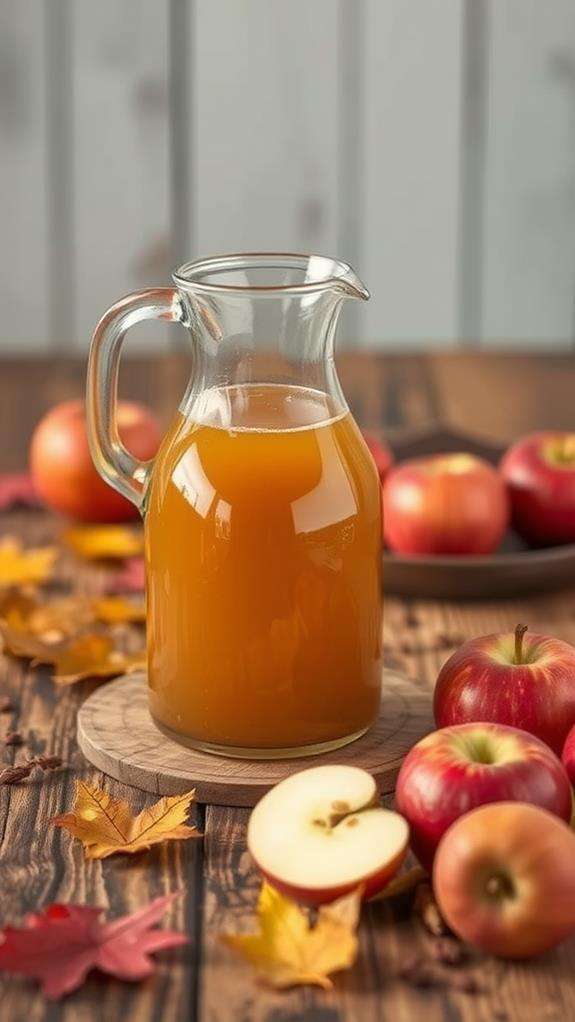
As you crack open a jug of apple cider, the sweet aroma of fresh apples fills the air, transporting you to a crisp autumn day. You're probably aware that apple cider is a natural, raw, handcrafted, unsweetened, unfiltered, and unpasteurized beverage, but did you know that its natural properties affect its shelf life? Unlike other drinks, apple cider won't last forever in the refrigerator, requiring special storage considerations to maintain its quality and flavor. You can enjoy this non-alcoholic apple cider on its own or use it as an ingredient in baked goods, salad dressings, and other recipes, making it a popular choice for fall-themed events and gatherings. When stored properly, fresh apple cider typically lasts up to one week in the refrigerator. Properly dehydrated fruits, such as dried apples, can last 5-8 years when vacuum sealed under proper conditions. If you want to keep it for longer, you can freeze it, extending its shelf life indefinitely. In fact, frozen cider can last indefinitely, but it's best consumed within a year for peak freshness.
Freezing Apple Cider Essentials

When freezing apple cider, you'll want to make sure you're prepared with the right techniques to preserve its quality and flavor. You'll need to cool the cider to room temperature, leave headspace in the container, and store it at the correct temperature to prevent spoilage. Grapes, for instance, require optimal refrigeration practices to maintain their freshness, and similarly, apple cider needs proper storage to retain its flavor. By following these essential steps, you'll be able to enjoy your frozen apple cider for months to come.
Cider Preparation Tips
Two crucial steps in freezing apple cider are cooling it to room temperature and leaving enough headspace in the container. This confirms that you Freeze Apple Cider effectively, preventing the growth of bacteria and other microorganisms. When freezing apple cider, you should fill airtight containers, such as glass or plastic bottles, or freezer bags, only 1/2 to 2/3 full. This allows for expansion as the cider freezes. Room temperature is essential, as it helps prevent bacterial growth. Once you've cooled and filled your containers, store them at 0°F (-18°C) or below to preserve the cider's quality and flavor. Proper preparation is key to enjoying your apple cider freezes for months to come. By following these steps, you'll be able to savor your frozen apple cider for 12-18 months, although it's best consumed within 3-6 months for peak flavor and texture.
Apple Cider Storage
You've taken the necessary steps to prepare your apple cider for freezing, now it's time to focus on storing it properly to maintain its quality and flavor. When it comes to apple cider storage, using a freezer-safe container is vital. You'll want to choose an airtight container, such as a glass or plastic bottle, or a freezer-friendly bag, to prevent air from entering and spoiling the cider.
Proper storage of frozen apple cider requires keeping it at 0°F (-18°C) or below, and storing it in the coldest part of the freezer. This will help maintain its quality and flavor. As the cider freezes, it will expand, so make sure to leave enough room in the container for expansion. Be sure to label the containers with the contents, date, and expiration date for easy identification. By following these storage tips, your frozen apple cider will last indefinitely, but it's best consumed within a year for peak freshness.
Freezing Methods Explained
Freezing apple cider requires attention to detail to guarantee the cider remains fresh and flavorful. You'll need to cool the cider to room temperature before freezing to prevent the growth of bacteria and other microorganisms. Using airtight containers, such as glass or plastic bottles, is necessary for freezing apple cider to prevent freezer burn and contamination. Make sure to leave about 1/2 way space in the container for expansion during freezing to prevent the container from bursting open.
| Container Type | Description | Advantages |
|---|---|---|
| Glass Bottles | Airtight, non-porous | Prevents freezer burn, maintains flavor |
| Plastic Bottles | Airtight, flexible | Easy to store, prevents contamination |
| Freezer Bags | Flexible, affordable | Takes up less space, easy to label |
| Tupperware | Airtight, reusable | Durable, easy to clean |
| Ice Cube Trays | Small, convenient | Perfect for small batches, easy to thaw |
When you freeze apple cider using these methods, you can store it for 12-18 months without affecting the taste or texture of the cider. By following these steps, you'll be able to enjoy your apple cider throughout the year.
Storage Tips for Apple Cider
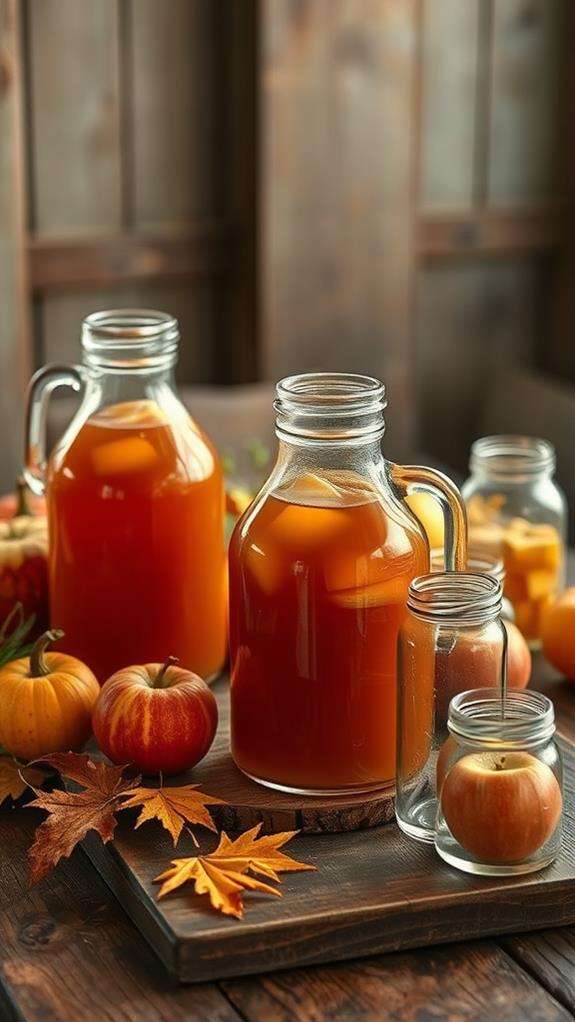
Your refrigerator is a great place to store apple cider, but if you want to keep it fresh for a longer period, freezing is the way to go. When freezing apple cider, crucially, you must remove some cider from the jug to prevent expansion and bursting. You'll also want to remove as much air as possible from the container before freezing to prevent spoilage and maintain the cider's quality. Proper storage, such as using airtight glass containers ideal refrigerator temperature, helps maintain the cider's quality and flavor. Frozen cider can be stored for 12-18 months, but it's best consumed within a year for peak freshness. Proper storage helps maintain the cider's quality and flavor, and frozen cider can be thawed and enjoyed with the same great taste. When storing frozen cider, make sure it's airtight and kept at 0°F (-18°C) or below. By following these storage tips, you'll be able to enjoy your apple cider all year round. Remember, freezing is a great way to extend the shelf life of your apple cider, and with the right storage techniques, you can savor the flavor for months to come.
Using Frozen Apple Cider Creatively
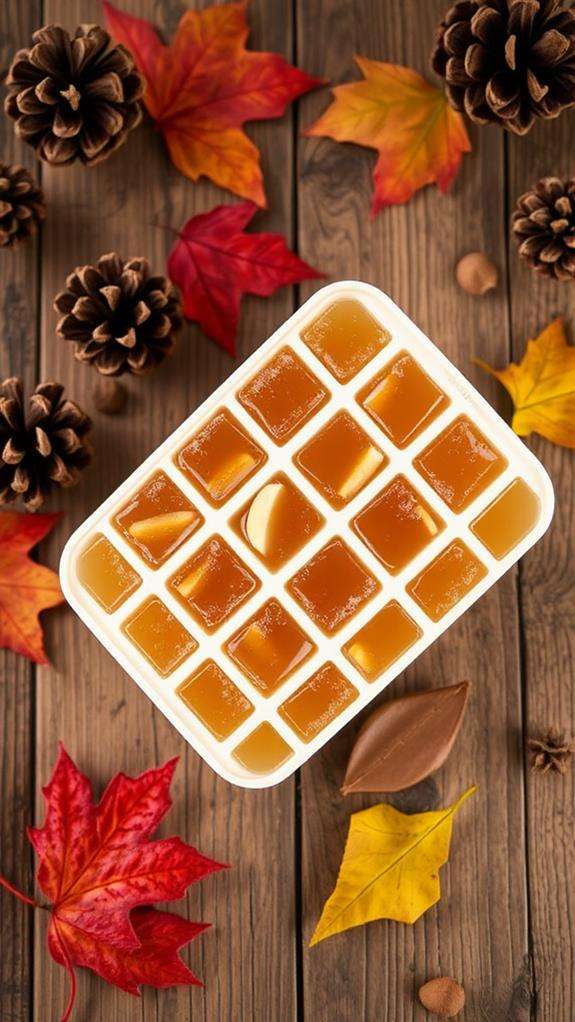
You can get creative with your frozen apple cider by using it in baked goods like muffins, cakes, and pies, where it adds moisture and a hint of autumnal flavor. Thawed cider can also be used as a base for recipes like cider-glazed pork chops or cider-braised short ribs. Plus, having frozen cider on hand means you can enjoy that fresh-pressed flavor year-round, even when apple cider is out of season.
Cider in Baking
A few cups of frozen apple cider can elevate your baked goods from ordinary to extraordinary. You can make delicious treats by substituting some of the liquid ingredients with frozen apple cider. This adds a rich, fruity flavor and moisture to your baked goods.
| Baked Good | How to Use Frozen Apple Cider |
|---|---|
| Apple Spice Cake | Replace 1/4 cup of water with frozen apple cider for added moisture and flavor. |
| Cinnamon Swirl Muffins | Use 1/2 cup of frozen apple cider instead of milk for a fruity twist. |
| Apple Cider Donuts | Add 1/4 cup of frozen apple cider to the dough for an intense apple flavor. |
| Pumpkin Bread | Substitute 1/2 cup of juice with frozen apple cider for a unique flavor combination. |
When using frozen apple cider in baking, make sure to thaw it first and pat it dry with a paper towel to remove excess moisture. This prevents your baked goods from becoming too wet or soggy. By incorporating frozen apple cider into your baking, you can create unique and delicious treats that will impress your family and friends.
Thawed Cider Recipes
Frozen apple cider reveals a world of culinary possibilities when thawed and used creatively. You can tap into a treasure trove of flavors and recipes by experimenting with thawed apple cider. For instance, you can use it to make delicious autumn-inspired cocktails, such as a Spiced Apple Cider Mule or a Cider House Rules Spritz. Thawed cider is also perfect for making slushies or cider ice cubes, which can be used as a revitalizing snack or added to beverages for extra flavor.
In addition, thawed cider can be used as a base for homemade salad dressings, such as a Cider Vinaigrette with Honey and Mustard, adding a tangy and sweet flavor to any salad. You can also use it in baked goods, like muffins, cakes, and pies, adding moisture and flavor to these sweet treats. Moreover, thawed cider can be used to make savory dishes, such as braised pork chops or roasted Brussels sprouts, adding a depth of flavor and moisture to these hearty meals. With thawed apple cider, the possibilities are endless, and you're limited only by your imagination!
Year-Round Flavor Boost
Several batches of frozen apple cider stashed away in your freezer can become a flavor powerhouse, waiting to elevate your dishes and drinks throughout the year. By freezing apple cider, you're preserving its nutritional value, including antioxidants, potassium, vitamin C, and fiber, making it a healthy addition to various recipes. You can thaw frozen apple cider and use it in baking, salad dressings, smoothies, or as a warm winter drink, providing year-round flavor and versatility.
Consider using frozen cider ice cubes in your favorite summer drinks or as an invigorating twist on traditional beverages. You can also thaw leftover apple cider and mix it with spices and apple slices to create a warm, comforting drink perfect for fall and winter gatherings. When using silicone muffin tin, you can portion out frozen apple cider into individual servings, making it easy to add to recipes or drinks. With frozen apple cider, the possibilities are endless, and you can enjoy its flavor and nutritional benefits throughout the year.
Julian Cider Mill's Apple Cider
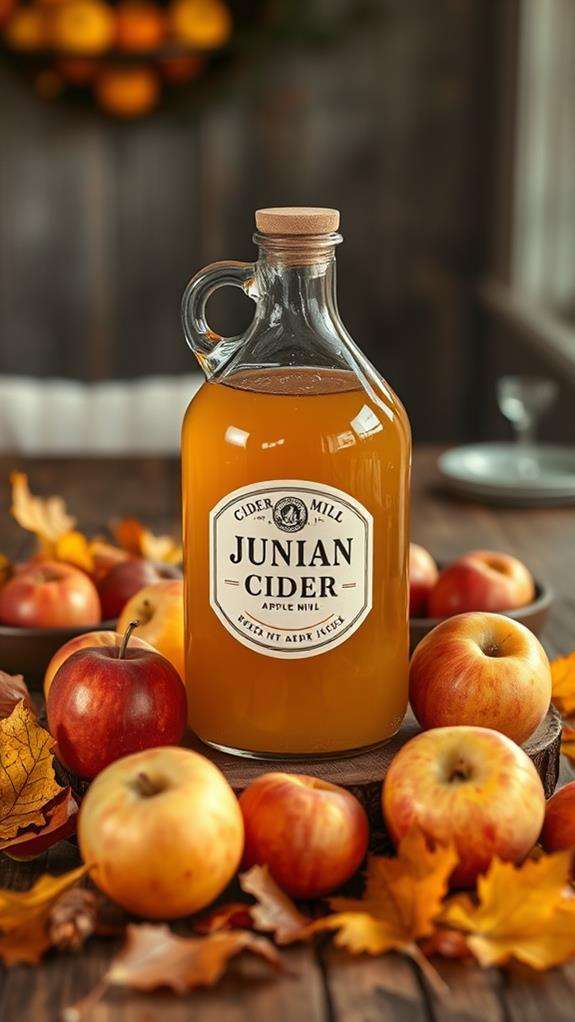
You're in for a treat with Julian Cider Mill's apple cider, which boasts an all-natural, raw, handcrafted, unsweetened, unfiltered, and unpasteurized profile that's reminiscent of traditional ciders from yesteryear. This cider is made with local Julian apples, giving it a unique flavor profile that's perfect for special occasions like Thanksgiving and Christmas. As a result, Julian Cider Mill provides tips and resources for cider storage and use, including freezing, to help customers get the most out of their cider. Since the cider is in its natural state, it requires special storage considerations, such as refrigeration or freezing, to slow down spoilage and maintain its quality and flavor. If you choose to freeze it, you can thaw and use it as needed, making it a versatile ingredient for baking, cooking, and drinking throughout the year. By freezing, you can enjoy the homemade apple cider taste year-round, as the cider freezes well and retains its flavor.
Preparing Apple Cider for Freezing
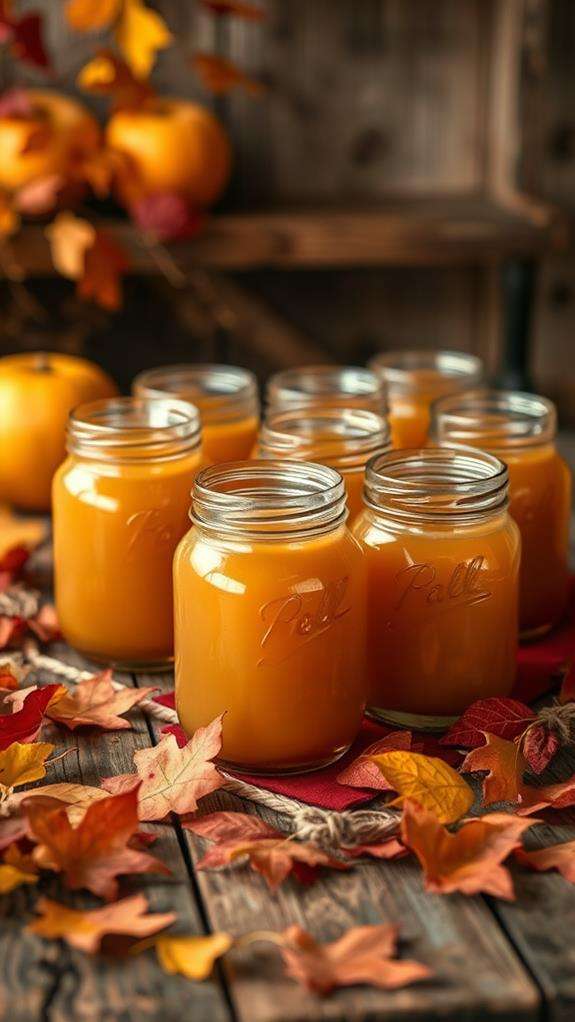
You'll want to cool your apple cider to room temperature before freezing to prevent bacterial and yeast growth. Next, prepare your containers by leaving about half of them empty to allow for expansion during freezing, and consider removing some cider from the jug to prevent bursting. Then, pour the cider into airtight, freezer-friendly containers, such as glass jars or plastic gallon jugs, to prevent freezer burn and other flavors from affecting the cider.
Cooling Apple Cider
Before freezing, it's essential to cool your apple cider to room temperature, as this step plays a significant role in preventing the growth of bacteria and other microorganisms. This cooling process helps slow down fermentation, which can affect the flavor and quality of the cider. To cool your apple cider, you'll need to do it slowly and naturally, as rapid cooling can cause the cider to become cloudy or develop off-flavors. You can store the cooled cider in the refrigerator at a temperature of 40°F (4°C) or below until it's ready to be frozen. Cooling the cider to room temperature can take several hours, depending on the initial temperature of the cider and the cooling method used. Make sure to monitor the temperature and adjust the cooling process as needed. By cooling your apple cider to room temperature, you'll be able to prevent bacteria growth and slow down fermentation, resulting in a higher-quality cider when you're ready to freeze it.
Cider Container Preparation
Now that your apple cider has cooled to room temperature, it's time to prepare the containers for freezing. You'll need to choose the right containers to store your apple cider. Use bottles (plastic or glass) with a tight-fitting and secure lid, or an airtight container that is freezer-friendly (plastic tupperware or glass). If you want to portion out small amounts, prepare ice cube trays or silicone muffin pan liners, leaving enough room for the cider to expand after freezing. Fill the container only about ¾ of the way, leaving enough room for the liquid to expand when it freezes, and add a label to the container noting the contents, date added to the freezer, and date to be removed. Remove some cider from the jug before freezing to prevent expansion and bursting, and make sure the lid is on tight if using a bottle or freezer container to prevent leaks. Using an airtight container or freezer bag will help store the frozen apple cider, and storing it in the bottom of the freezer for lower temperatures will keep it fresh.
Freezing Apple Cider in Containers

When preparing to freeze apple cider in containers, it's crucial to cool it to room temperature first, which will prevent the growth of bacteria and other microorganisms that thrive in warm environments. Once cooled, you can transfer the apple cider to airtight containers, such as glass or plastic bottles, to prevent contamination and spoilage.
| Container Preparation | Freezing Tips |
|---|---|
| Cool apple cider to room temperature | Leave 1/2 inch of headspace in containers |
| Use airtight containers (glass or plastic bottles) | Remove as much air as possible from the container |
| Store frozen apple cider at 0°F (-18°C) or below |
Remember to leave about 1/2 inch of headspace in the containers to allow for expansion during freezing, as water in the cider will expand as it freezes. By following these steps, you can store frozen apple cider for 12-18 months, with the quality and flavor remaining intact.
Defrosting and Enjoying Frozen Cider
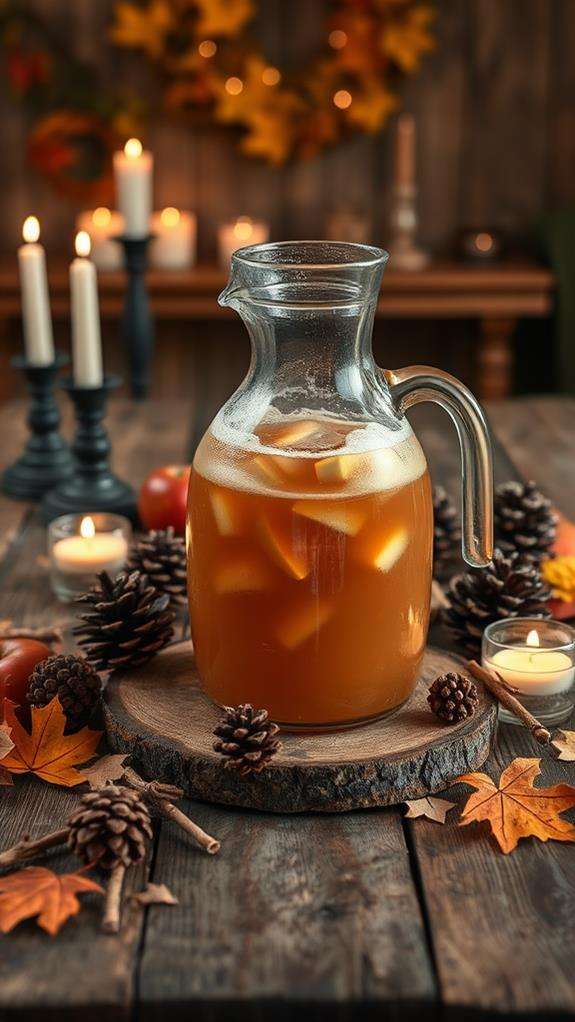
You've successfully frozen your apple cider, and now it's time to enjoy it. When defrosting your frozen apple cider, you have two options: thawing it in the refrigerator or at room temperature. To preserve the flavor and texture, it's best to thaw it slowly. Once thawed, you can enjoy your apple cider warm or chilled, sweetened or unsweetened, and with or without spices, making it a versatile beverage for any occasion. You can also use thawed apple cider as an ingredient in baked goods, salad dressings, smoothies, and other recipes, adding a boost of flavor and nutrition to any dish. Before consuming, make sure to check the cider for any signs of spoilage, such as an off smell or slimy texture, and discard it if it appears to be spoiled. The good news is that frozen apple cider can be thawed and refrozen multiple times without affecting its quality, making it a convenient and shelf-stable ingredient to have on hand.
Apple Cider Nutrition and Benefits
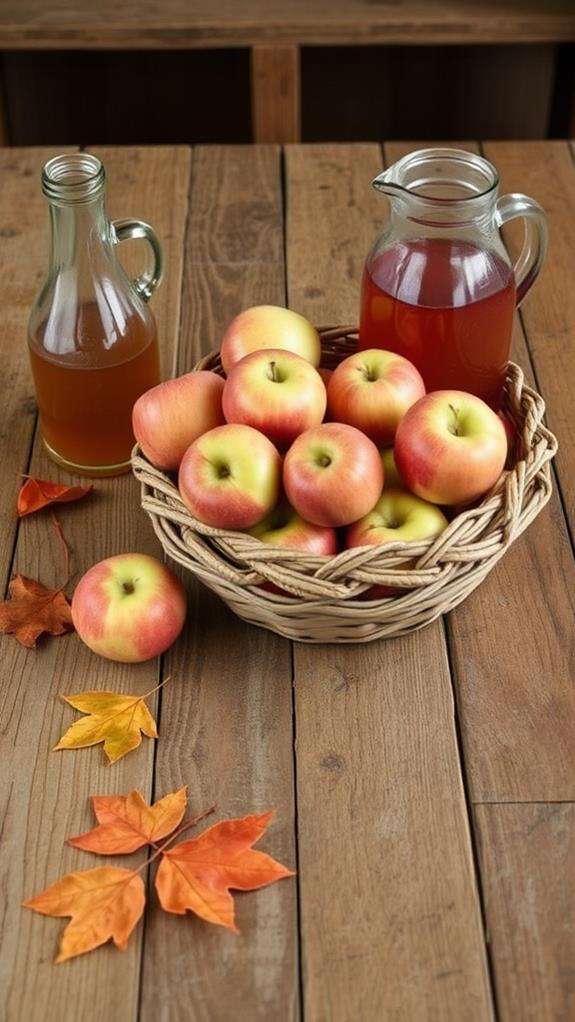
Apple cider is more than just a delicious beverage – it's also a nutritious one, packed with antioxidants, polyphenols, and essential vitamins and minerals. When you drink apple cider, you're getting a good dose of antioxidants and polyphenols, which are beneficial compounds that can help protect your body against free radicals and oxidative stress. In fact, apple cider contains a higher amount of these compounds than apple juice. One cup of apple cider also provides about 10% of your daily recommended intake of potassium, an essential mineral for heart health and muscle function. Additionally, apple cider is a low-calorie beverage, with only 117 calories per cup, making it a popular choice for those watching their weight. You'll also get a boost of vitamin C, which supports immune function and can help fight off infections and diseases. The antioxidants and polyphenols in apple cider have anti-inflammatory properties, which may help reduce the risk of chronic diseases like heart disease and cancer. So, the next time you enjoy a glass of apple cider, remember you're not only treating your taste buds, but also your body.
Freezing and Fermentation Considerations
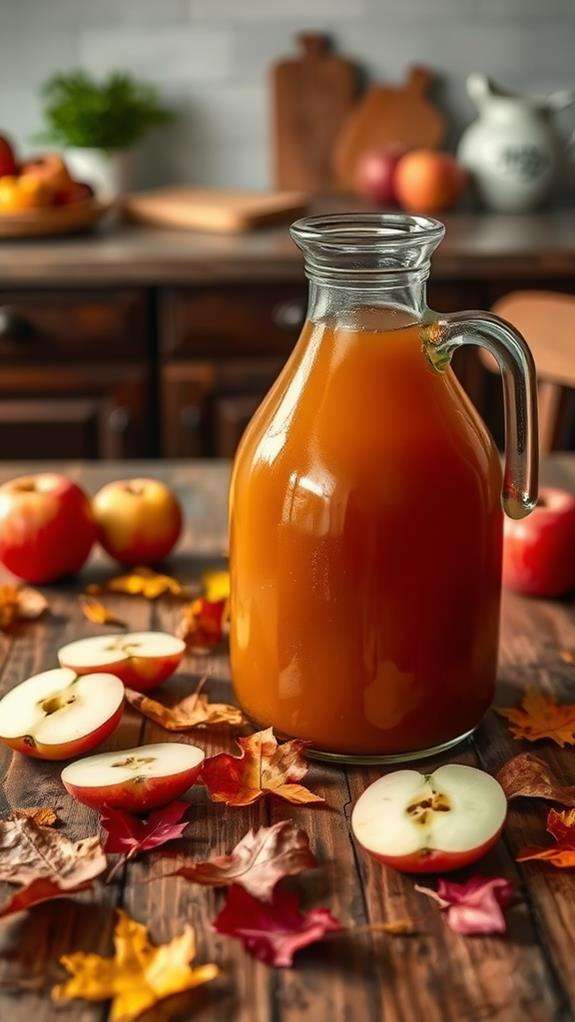
By the time you're ready to store your apple cider, you'll need to decide whether to freeze it or let it ferment. Freezing apple cider is a great way to preserve its flavor and nutrients, but understanding the fermentation process is vital. If you're not planning to drink your apple cider within a few weeks, freezing is a better option. When apple cider freezes, the water inside the cider forms ice crystals, which helps preserve the cider's flavor and nutrients. However, if you're looking to create a fermented apple cider, such as hard cider or apple cider vinegar, you'll need to let it ferment. Fermentation occurs when yeast or bacteria convert the cider's natural sugars into alcohol or acetic acid. To freeze apple cider, pour it into a sealed container, leaving about an inch of headspace, and store it in the freezer at 0°F (-18°C) or below. This will help prevent the cider from expanding and bursting the container.
Frequently Asked Questions
What Is the Best Way to Freeze Apple Cider?
When freezing apple cider, you'll want to cool it to room temperature first to prevent bacterial growth. Then, pour it into airtight containers, like glass or plastic bottles, leaving about half the space empty for expansion. Label the containers with contents, date, and expiration date. Remove some cider from the jug to prevent bursting, and store it in the freezer for 12-18 months. This way, you'll preserve the taste and texture of your apple cider, ready to be thawed and used in your favorite recipes.
How Long Does Apple Cider Last in the Freezer?
Imagine sipping a warm cup of apple cider on a crisp winter morning, the flavors and aromas transporting you to a cozy orchard. When you freeze apple cider, you can enjoy it for a long time. In fact, it can last indefinitely, but for peak freshness and flavor, it's best consumed within a year. You can store it in the freezer for 12-18 months without significant quality loss, and it'll still be delicious and nutritious.
How Do You Thaw Frozen Cider?
You'll need to thaw that frozen cider you've stored away! To do so, simply place it in a bowl and refrigerate until it's fully thawed. If you're in a rush, use your microwave's defrost setting, but be careful not to overheat it. You can also thaw it at room temperature, but the fridge is a safer bet to prevent bacterial growth. Once thawed, use it within 24 hours for peak flavor and freshness.
What Happens When You Freeze Cider?
When you freeze cider, the water inside the juice forms ice crystals, which can cause the cider's natural particles to settle at the bottom of the container. This separation can lead to a cloudy or murky appearance when thawed. Additionally, freezing can affect the cider's flavor and aroma, making it taste slightly sweeter or more bitter. However, if you freeze cider correctly, these changes can be minimal, and the cider will still be safe to drink and retain most of its original flavor.
Conclusion
As you've learned, freezing apple cider is a great way to preserve its flavor and nutrients. Remember, "an apple a day keeps the doctor away," and frozen apple cider can be a delicious and healthy addition to your daily routine. By following the tips outlined above, you can enjoy your cider year-round. So, go ahead and stock up on apple cider, freeze it with confidence, and reap the benefits of this tasty and nutritious beverage.





